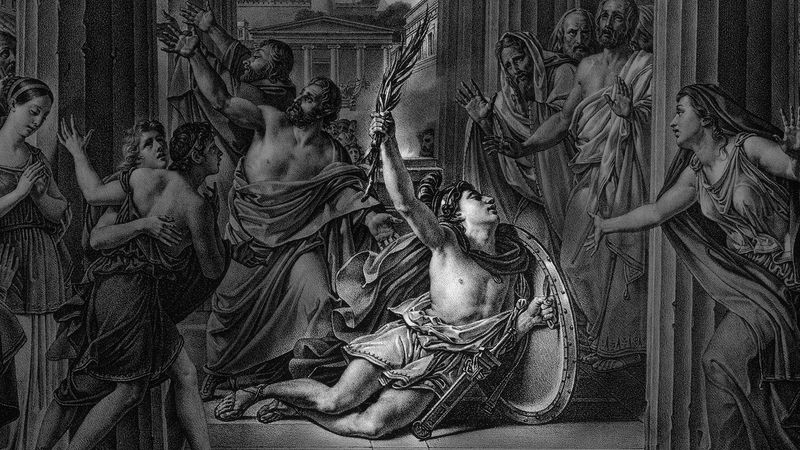Why was Marathon Important to Ancient Greece
The Battle of Marathon was important to Ancient Greece as it marked the first major victory against the Persian Empire, boosting Greek morale and establishing a reputation for military prowess. This battle, fought in 490 BC, demonstrated the strength and determination of the Athenians, inspiring a sense of unity and pride among the city-states.
The Persian invasion posed a threat to Greek independence, and the Athenian victory at Marathon served as a pivotal moment in shaping the course of Western history. The defeat of a larger, better-equipped force by the Greeks was a testament to their strategic prowess and courage.
The Battle of Marathon not only secured immediate peace, but also set the stage for the subsequent Persian Wars, solidifying the significance of this event in Ancient Greek history.

Credit: study.com
The Mythical Origin
Ancient Greece is renowned for its rich history, where myths and legends intertwine with reality. One such myth is the fascinating story of Marathon, which holds a significant place in ancient Greek culture and tradition. The mythical origin of Marathon can be traced back to the legendary hero Pheidippides.
Story Of Pheidippides
Pheidippides, a courageous messenger, was known for his remarkable running abilities. Legend has it that during the Battle of Marathon in 490 BCE, Pheidippides was tasked with a critical mission. The Athenians had defeated the mighty Persian forces, and it was paramount to convey this momentous victory to the city of Athens.
Pheidippides’ legendary run from Marathon to Athens, covering a distance of approximately 26 miles, is widely recognized as the first marathon in history. He sprinted tirelessly, fueled by a single mission – to deliver the exhilarating news of triumph.
Connection To The Battle Of Marathon
The Battle of Marathon, a pivotal event in ancient Greek history, was fought between the Athenians and the Persians. This clash marked the first Persian invasion of Greece, threatening the freedom and autonomy of the Greek city-states. The Athenians, realizing the gravity of the situation, amassed their forces and strategically confronted the Persian army.
It was in this historical battle that the Athenians achieved a remarkable victory against all odds. The successful defense of their homeland against the invaders not only ensured the survival of Athens but also bolstered the Greek morale to withstand future invasions.
The connection between the Battle of Marathon and Pheidippides’ heroic run is profound. His fabled marathon served as a symbol of extraordinary human determination and sacrifice, offering hope and inspiration to the Athenians. Pheidippides’ selfless act became an everlasting testimony to the valor and resilience of the ancient Greeks.
Ancient Greece held the Battle of Marathon and Pheidippides’ legendary run in high regard, embodying the values of bravery, endurance, and national pride. The significance of Marathon extends far beyond mere historical accounts, leaving an indelible mark on Greek culture, sports, and even the modern marathon races we witness today.
Historical Significance
The historical significance of the Battle of Marathon in ancient Greece cannot be overstated. From impacting Athenian democracy to boosting Greek morale, this pivotal event left a lasting imprint on the cultural and political landscape of ancient Greece.
Impact On Athenian Democracy
The Battle of Marathon played a critical role in shaping the future of Athenian democracy. The victory of the Athenians over the Persians instilled a sense of pride and confidence among the citizens, leading to a strengthening of democratic principles and institutions. The successful defense and the subsequent reshaping and strengthening of Athens and its democratic system serve as a cornerstone in the evolution of democracy.
Boosting Greek Morale
One of the most significant consequences of the Battle of Marathon was the boost it provided to Greek morale. The unexpected triumph of the Athenians against the much larger Persian army sparked a sense of unity and determination among the Greek city-states. This morale boost fueled further resistance against Persian aggression and ultimately paved the way for the preservation of Greek cultural identity and independence.
Military Strategy
The military strategy used in the Battle of Marathon was crucial to its significance in ancient Greece. The conflict between the Athenian and Persian forces, as well as the tactical maneuvers employed, played a pivotal role in shaping the outcome of this historic event.
Athenian Vs. Persian Forces
In 490 BC, the Athenian army faced the invading Persian forces led by Darius I. The Athenians, although outnumbered, demonstrated remarkable courage and resilience. Their infantry, known as hoplites, utilized their phalanx formation to counter the Persian attack, which proved to be a decisive factor in the battle.
Tactics Used In The Battle
The Athenians, under the leadership of Miltiades, devised a shrewd military strategy to counter the Persian threat. Utilizing their knowledge of the local terrain, they positioned themselves advantageously and launched a surprise attack, catching the Persians off guard. Their strategic maneuvers and precise coordination enabled them to achieve a stunning victory, repelling the Persian invasion and securing a pivotal moment in Greek history.

Credit: en.wikipedia.org
Legacy Of The Marathon
Ancient Greece held the Marathon in high regard for its symbolism of victory and heroism. The decisive battle against the Persians shaped Greek history and highlighted their unity and resilience. This event marked a pivotal moment of pride and nationalism in the ancient world.
The legacy of the marathon is a testament to the enduring impact this ancient Greek race has had on the world. From its origins in ancient Greece to modern times, the marathon has retained its significance as a symbol of endurance, perseverance, and human achievement. Today, the marathon continues to captivate athletes and spectators alike, serving as a powerful reminder of the historic feats accomplished by the ancient Greeks.
Modern Marathons
Modern marathons, inspired by the legendary story of the messenger Pheidippides who ran 26.2 miles from Marathon to Athens to announce the Greek victory over Persia, have evolved into international events celebrated in various corners of the globe. These highly anticipated races attract thousands of athletes from different countries, all eager to test their physical and mental limits. Iconic marathons such as the Boston Marathon, New York City Marathon, and London Marathon have become prestigious and sought-after events, showcasing world-class talent and attracting massive crowds of enthusiastic spectators.
Symbolism In Sports
Beyond being an elite athletic event, the marathon has come to represent much more. Its inherent symbolism resonates deeply within sports culture, serving as a metaphor for life’s challenges and triumphs. The grueling distance embodies the notion that persistence and sheer determination can overcome even the most daunting obstacles. Athletes participating in marathons often find themselves pushed to their limits, testing their physical and mental capabilities. The marathon is a testament to the human spirit and the power of pursuing one’s goals with unwavering dedication.
Moreover, the marathon’s symbolism extends beyond the realm of sports. It has become a metaphor for endurance and resilience that transcends borders, languages, and cultures. The universal appeal resonates with individuals pursuing their own personal journeys, whether it be overcoming adversity, achieving career milestones, or pursuing lifelong dreams. The marathon encapsulates the notion that every individual has their own figurative “marathon” to run, and that success lies in embracing the challenges along the way.
Cultural And Artistic Representations
Marathon held great significance in Ancient Greece, serving as a symbol of victory and endurance. Its cultural and artistic representations depict heroic tales of the Athenian victory over the Persians, fostering national pride and unity.
The Marathon holds a significant place in Ancient Greek culture and art. It inspired numerous literary works and artistic creations that celebrated the historic event.In Literature And Arts
– Poets like Pindar and Aeschylus immortalized the Marathon in their works. – Artists depicted the heroism of the Athenian messenger who ran the Marathon. – Sculptors crafted statues glorifying the victorious warriors of the battle.In Olympic Games
– The Marathon race originated from the historic run by the messenger to Athens. – Athletes participating in the Marathon honored the tradition of the ancient event. By incorporating the Marathon into their cultural and artistic expressions, Ancient Greeks preserved the legacy of this monumental episode in their history.
Credit: www.britannica.com
Frequently Asked Questions Of Why Was Marathon Important To Ancient Greece
What Does The Marathon Race Have To Do With Ancient Greece?
The Marathon race originates from a Greek legend in which a messenger ran from Marathon to Athens. This event led to the modern Marathon race’s origins in ancient Greece.
Why Was The Battle Of Marathon So Important?
The Battle of Marathon was important because it marked a significant victory for the Greeks against the Persians. It boosted morale and proved Greek military prowess. This success also prevented the Persian invasion of Greece, ensuring the survival of Greek culture and democracy.
What Is Significant About Marathon?
Marathon is significant because it is the birthplace of the modern marathon race. This historical event took place in 490 BC, when the Greek messenger ran 26. 2 miles to deliver news of victory. Today, marathon races are revered worldwide for promoting endurance, determination, and camaraderie among participants.
Conclusion
The Marathon holds deep historical significance for ancient Greece. Its heroic tale of the Athenian soldier running to deliver news of victory resonates even today. It symbolizes determination, bravery, and patriotism. The Marathon’s importance lies in its legacy, shaping the proud Greek identity, and inspiring athletes around the globe.
Understanding the Marathon’s significance illuminates the rich cultural tapestry of ancient Greece.






